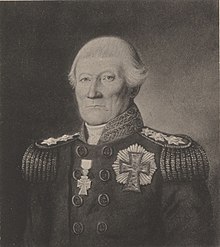Steen Andersen Bille (1751-1833)
| Steen Andersen Bille | |
|---|---|
 |
|
| Born |
22 August 1751 Assens, Funen, Denmark |
| Died | 15 April 1833 (aged 81) |
| Buried | Holmens Kirkegård, Copenhagen |
| Allegiance |
|
| Service/branch |
|
| Years of service | 1762–1833 |
| Rank | Admiral and Privy Counsellor |
| Battles/wars | Action of 16 May 1797, Battle of Copenhagen, Battle of Copenhagen, Gunboat War |
| Awards | Grand Cross of the Order of the Dannebrog |
| Relations | Father: Rear Admiral Daniel Ernst Bille Son: Vice Admiral Steen Andersen Bille |
Steen Andersen Bille (1751–1833) was a successful Danish naval officer and a member of the Bille family. He rose to the rank of Admiral and became a Privy Counselor during the period of Denmark's policy of "armed neutrality" following the Gunboat War with Britain. He was instrumental in the rebuilding of the Danish Navy after 1814.
Steen Andersen Bille was born on 22 August 1751 in Assens, on the Funen coast of the Little Belt, where his father Rear Admiral Daniel Ernst Bille was then stationed. Steen Andersen Bille became a cadet at the age of eleven, despite being of poor physique, having already experienced a trial voyage in the previous year.
In 1765, as a cadet, Bille was in the frigate Hvide Ørns when storms and contrary winds held the ship in the Baltic for so long that it was feared the ship would founder – prayers were said in churches around the land for the ship's safety (to good effect, seemingly). As one of the most able cadets of his year, he was promoted to Junior Lieutenant on 16 March 1768, serving then, and again in 1773, in the ship-of-the-line Norske Løve under his father's command.
On 22 March 1773 he was promoted to Senior Lieutenant. In 1775 he had an independent armed command in the merchant ship Mercurius preventing smuggling to enforce control measures against an outbreak of Rinderpest (Cattle Plague) in Schleswig Holstein.
In 1777 he was posted to the Danish West Indies (DWI) for two years where he became close friends with the Governor General Peter Clausen and two future Governors, Ernst Walterstorff and Peter Oxholm. On his return to Denmark he became second-in-command of the frigate Bornholm, which returned almost immediately to the DWI. Sixty of the crew, including Bille, became sick and were left on St Thomas as the ship escorted a convoy to Guadeloupe. On the way the convoy encountered three British privateers (or pirates) and all the merchant vessels were lost. This upset Bille for a long time afterwards, despite his not being responsible for the loss.
Bille was promoted to Commander on 18 October 1781 and he was immediately permitted to go on a trading voyage in the Danish East Indiaman Copenhagen, one of the poorest sailing ships the company owned. After a difficult voyage to Holland, Norway and the East Indies he returned successful, but had suffered many fatalities among his crew. On the outward voyage, scurvy had broken out and not one seaman was fit for duty by the time he reached Cape Town. There Bille also broke an arm, which was not set properly and which gave him problems for the rest of his life. Arriving in Bengal, he sent his second officer home in disgrace, for embezzlement!
...
Wikipedia
